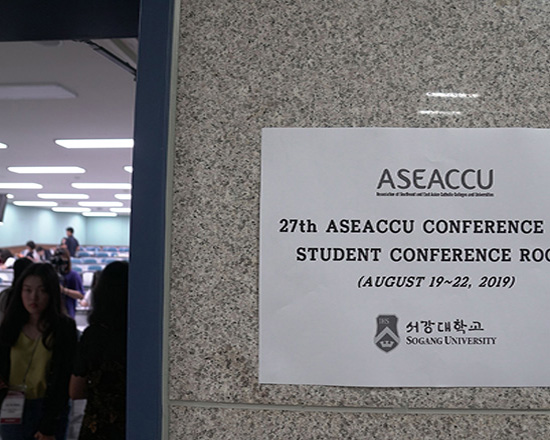Current and emerging issues: the students´ perspective

Sogang University
The 27th ASEACCU Annual Conference, just like in the previous years, students played an important role in the discussion of important issues. In this year’s conference held at Sogang University in South Korea, the students have taken active part in the conversation on significant topics such as (1) Politics of the Korean Peninsula, (2) Gender Equality and Social Inclusion, and (3) Reconciliation, Human Rights, and Democracy: Challenges for the People of East Asia.
Politics in North and South Korea, the first topic, provided students with a comprehensive understanding of the political dynamics of North and South Korea which traced the history of political and economic development and international relations of the Korean peninsula, showing how South Korea became democratized and how Juche ideology has affected the establishment and operation of a totalitarian system in North Korea. The issue of having different political ideologies existing within North and South Korea posed a very relevant question – With the existence of several ideologies within a country and inter-countries, how do we reach reconciliation?
The discussion on Gender Equality and Social Institution centered on gender equality being equated to the equal rights, responsibilities and opportunities of women and men. It emphasized uplifting human security where there is freedom from fear and freedom from want and that in order to achieve equality in contemporary society, there is a great need to break discriminative gender dimensions or stereotypes created by the society.
The last topic Reconciliation, Human Rights, and Democracy: Challenges for the People of East Asia focused on enormous human rights violations that happened during the two world wars in the 20th century in which states, along with emerging international organizations and supported by the non-governmental sector, adopted liberal moral and normative standards as universal standards, bringing attention to individual rights and protection by international legal regimes. The human security paradigm challenges the traditional notion of national security. Its main assumption is that the people-centered view of security is necessary for national, regional and global stability and the proper referent for security should be the individuals and groups of people rather than the state.
Aside from these lectures, the students were also tasked to present their own topics which were formulated during a brainstorming session which provided them the wonderful opportunity to have a deeper understanding of the various situations in different countries.
